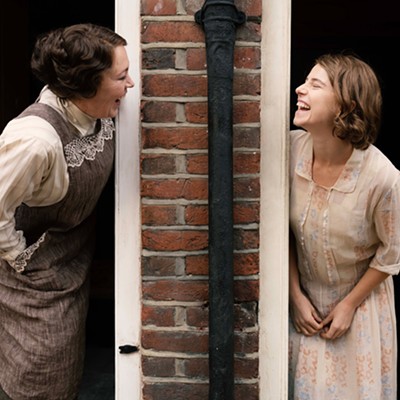You know the story: A loved one is nabbed, the cops don’t know what they’re doing (or aren’t involved), a relative of the victim goes after the perpetrator(s). Think Taken, Frantic, Ransom, Commando, The Marine. The list could go on, but the well-worn premise goes in all sorts of new directions in Prisoners.
This is, in Hollywood terms, a two-hander — a story with two protagonists, both equally involved in solving the crime and setting things straight. Hugh Jackman is Keller Dover, a happy family man whose young daughter, along with a friend’s daughter, vanish after going out to play during a Thanksgiving dinner. Jake Gyllenhaal is Detective Loki, the loner cop with a record of solving every case he’s been given, who’s assigned this one.
From their first meeting, these two are at odds. Keller thinks that the detective isn’t working fast enough and isn’t paying attention to obvious clues, while Loki is convinced that Keller is getting in the way of his investigation. In the film’s early stages, it’s pretty obvious who’s responsible for the kidnapping. It’s that creepy guy Alex Jones (Paul Dano), the fellow with the IQ of a 10-year-old who was sitting in his RV right outside the house where the girls disappeared, and who is arrested. But hold on: There’s no proof, and without proof, a suspect can only be held for questioning for a certain amount of time. After all, this lost soul could have just been parked there to take a brief nap. There are certainly no signs of any struggle inside the RV, and Alex has no record. Although there is a moment — when Keller, against the detective’s warnings, starts following Alex as Alex is out taking his little dog for a “walk” — that we’re assured he’s a bona fide weirdo.
In one of a very impressive series of twists (this is the only one I’ll give away), a desperate Keller — positive that Alex has his daughter hidden away somewhere — takes Alex himself and hides him away somewhere, ready to inflict all sorts of barbarous punishment on him if he doesn’t talk. Suffice it to say he doesn’t, and the film, under the tense direction of Denis Villeneuve (Incendies), bursts into some sections of brutal violence (let’s hear it for the make-up people in those spots where we see the aftermath).
But this isn’t exactly a vigilante film. It’s more of a cat-and-mouse game in which the players are both good guys trying to prove who the bad guy is, albeit working in totally different manners. It features a slightly over-the-top performance from the grieving, fiery Jackman, and a strangely (and well done) underplayed one from Gyllenhaal, whose character has a nicely subtle air of mystery around him, and whose feelings are sometimes revealed through his constant display of nervous blinking tics. It’s a film filled with everyday normal people who are visibly upset, playing out a story that’s shocking and nerve-racking, but you can’t take your eyes away from it as that negative energy ebbs and flows.
All of this intensity is pushed along by a grim musical score that’s often made up only of low notes, held out for long stretches. Its title is perfect, because in the end, it’s very clear that every character is a prisoner of his or her own doing. And speaking of endings, Prisoners has a very cool one.
















